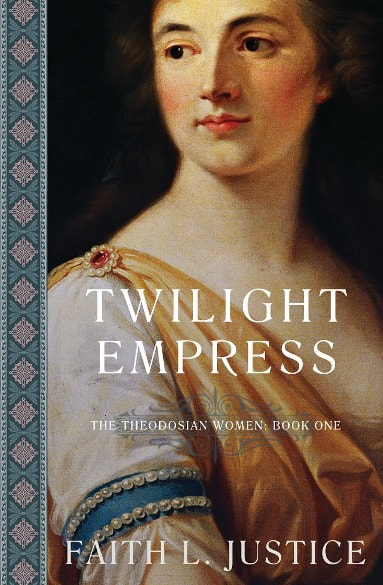
BY FAITH L. JUSTICE
Publication Date: May 12, 2017
Raggedy Moon Books
eBook & Print; 392 Pages
Series: The Theodosian Women, Book 1
Genre: Fiction/Historical/Action & Adventure
Twilight Empress tells the little-known story of a remarkable woman—Galla Placidia, sister to one of the last Roman Emperors. Roman princess, Gothic captive and queen—Placidia does the unthinkable—she rules the failing Western Roman Empire—a life of ambition, power and intrigue she doesn’t seek, but can’t refuse. Her actions shape the face of Western Europe for centuries.
A woman as well as an Empress, Placidia suffers love, loss, and betrayal. Can her strength, tenacity and ambition help her survive and triumph over scheming generals, rebellious children, and Attila the Hun? Or will the Dark Ages creep closer and bring down the Empire?
AMAZON US | AMAZON CAN | AMAZON UK |
BARNES AND NOBLE |
IBOOKS | INDIEBOUND | KOBO

To contact Faith, read her essays and interviews, or get a sneak preview of her historical novels, visit her website at www.faithljustice.com. You can also find her on Facebook, Twitter, and Goodreads.
Galla Placida is sister to one of the last Roman Emperors in 400 AD. As a young woman Placida is captured by the Goths. Growing up in their camps, she comes to respect their way of life and skills. Placida especially enjoys the company of Ataulf. She eventually marries Ataulf and becomes Queen of the Goths by his side, helping with decisions and in battle. Placida's brother, however, sees her marriage to Ataulf as a political move by the Goths and orders her home. Unfortunately, Ataulf is killed in a plan to overthrow him. Placida is captured and uses her strength and intelligence to escape and enact revenge. Now, she must return to her brother and the marriage that he has arranged for her; although, she returns with a groups loyal to her until the very end.
Placida is a force to be reckoned with. I am so happy I got the chance to learn about her life. Even though women were not allowed to rule in their own right, Placida managed to keep Rome together in its dying days. I was amazed by her patience and willingness to understand and learn from the Goths when she was originally captured instead of just fight back. She seemed to continually look at decisions long term and for the good of her people and land. The story follows Placida from a young women to her death. I very much enjoyed watching her grow and seeing how she hand a hand in political decisions through her brother, both of her husbands and her son. As conflict rose throughout the territories and Placida aged, Placida's job became more and more difficult. Through the writing, I got a wonderful sense of Placida's character while sticking to the history of the time period. Overall, a breathtaking and immense journey through one inspirational and impactful woman's life in Rome.
This book was received for free in return for an honest review.
Ravenna, 410
Constantius, general in the Roman Army and advisor to Emperor Honorius, strode down the colonnade shaking with anger and fear—anger at Honorius for bollixing the last agreement Constantius had negotiated with the Goths, and fear for Placidia. Most of the Roman women Constantius knew were simpering fools, good for idle chatter and little else. Placidia was different. He would marry her even if she were a milkmaid. That she was the Emperor’s sister was a complication.
Constantius opened a low gate and stepped into a dusty courtyard. His entrance set off a flurry of offended squawks as chickens of several fancy breeds scurried from his presence.
If only those bloody Goths would do the same.
The Emperor, in the opposite corner, spread chicken feed with a sweep of his hand. At nearly twenty-six, Honorius had ruled for seventeen years, but still had the aspect of an unformed boy, with a weak chin and dull eyes. Yet Honorius was Emperor, and therefore commanded Constantius’ respect and obedience, as had his more worthy father before him. The General only wished the young man paid as much attention to his Empire as to his flock of fowl.
Constantius stalked across the poultry yard and found a spot free of chicken dung in which to kneel. “Most Mighty Emperor, I bring grave news. Rome is taken.”
“That’s impossible.” Honorius paled, and looking frantically around the poultry yard. “He ate from my hand only moments ago.” Honorius shot away and picked up a noisy rooster, easily the largest in the pen. “See? Here he is, safe, as I said.”
Constantius rose, took a deep breath, and instantly regretted it when the dust and grain chaff sent him into a paroxysm of coughs. He motioned to a slave for a drink. The man immediately brought a cup of chilled wine. After quelling the dusty tickle, he tried again. “Not the rooster, My Emperor, the city of Rome is taken by Alaric. Your agents sped here with the news.”
“Rome—not you, my pet…” Honorius smoothed the glossy black feathers of his rooster “…got what it deserved. Deposing me and setting up their own Emperor! Those traitorous Senators bent over and bared their backsides for that filthy Goth.”
Only in self-defense. Constantius held his tongue with long practice.
Every time negotiations broke down with the Emperor, safe behind the impregnable marshes of Ravenna, Alaric besieged Rome. The city endured starvation, plague, and crushing payments of gold and silver, until last year, when the Senate acquiesced to Alaric’s demands and raised one of their own to the purple. Only the timely arrival of troops from Constantinople saved Honorius from the ignominy of abdicating. With this third siege in three years, Alaric had evidently asked for nothing and gave no quarter.
“The Romans are a stiff-necked bunch,” and it is too late for them. “But do you forget the Princess Placidia? She might be in danger.”
Honorius’ face hardened. “Placidia fled to Rome. She could have returned to safety any time during the last four years, but refused. When she comes to me, I will forgive her, but I will not beg her to return.”
Constantius was determined to bring Placidia safe to Ravenna, but he knew the Emperor’s moods. Now was not the time to press the subject. “Sire, shouldn’t we repair to the audience chamber? The court will need your reassurances.”
Honorius looked at his beloved pets with regret. “This is the only respite I have from ceremony and duty.” He sighed. “But these are perilous times, and I should make myself available to my ministers.”
Constantius linked arms with the Emperor and escorted him through the gate, where a contingent of guards awaited. As they entered a marble passage, a servant ran into them, sending the Emperor reeling. The man, a twitchy Greek slave with a bad complexion, threw himself onto the floor, babbling apologies, as four guards menaced him with spears.
“Get up, man!” Honorius grumbled, ostentatiously dusting himself off. “I should send you to the mines. Why careen around the corner in such a fashion?”
“An important delegation seeks your immediate attention, Your Most Forgiving Highness. They await you in your audience chamber.”
“And who are these worthy gentlemen?”
“Senators from Rome, Most Charitable One.” The slave threw himself on the floor again. “Please forgive your humble and obedient slave for any unintended injury to your August Person, Highness.”
“Yes, yes. Get out of my way.”
The slave, like many of his fellows, had perfected the art of disappearing quickly, and did so.
Before they reached the audience chamber, a horde of eunuchs, led by the Provost of the Sacred Cubicle—the eunuch in charge of the imperial household, and the emperor’s most intimate servant—whisked Honorius away to be dressed for his appearance. Constantius didn’t envy the emperor’s obligation to ceremony and protocol. No wonder the poor man liked to escape to his chicken pen! If I were emperor…Constantius shoved that treasonous thought away. He had no ambition to be a slave to imperial eunuchs. He much preferred his current role as the power behind the throne. Constantius entered the purple marble-clad audience chamber, which was filled nearly to bursting with courtiers, and moved to the side to better observe the coming drama.
After several minutes, a trumpet blasted. The crowd quieted and went to their knees. The court announcer declaimed, “All bow before the Most Excellent and Invincible…” Constantius winced at the inappropriate honorific. “…Flavius Honorius Augustus, son of the Great and Divine Flavius Theodosius Augustus, nine-times Consul of Rome and Father of His People.” The sonorous voice went on for several minutes, listing the rest of the emperor’s honors and all the military victories that occurred during his reign—another irony, since the emperor, unlike his martial father, had never led troops.
With a final trumpet flourish, Honorius entered the room, enveloped in his gold thread and pearl encrusted paludamentum—his purple imperial cloak—fastened with a gold fibula in the shape of a multi-pointed star set with a brilliant ruby. Rubies also embellished the gold diadem that sat on the newly oiled and coifed curls. He carried a gold-headed staff of office. Honorius moved sedately to the center of the dais and took his seat on a gilded ivory chair, well-padded with purple silk cushions. Guards flanked him. Scribes waited to record his every word. The Emperor waved his hand in a dismissive gesture. The announcer gave the much awaited order, “All may rise.”
The courtiers came to their feet with only a few suppressed groans and the occasional helping hand for the more elderly or corpulent. Constantius rose easily, but noted a new twinge in his left knee.
The announcer introduced the delegation from Rome. The two men approached the dais. They had not even changed their dusty clothes. Constantius’ nose twitched at their stench. Both were pale from exhaustion; the fat one walked with a limp.
Honorius maintained a serious expression. “What news do you have for me about Rome?”
Both men threw themselves face down at the Emperor’s feet, with loud cries and acclamations. Honorius let the show go on a few moments before giving the men permission to rise and asking again for news.
“Betrayal, Most August One. During negotiations, that dog Alaric gave several comely youths as gifts to high officials…”
And the greedy empty-headed asses accepted those “gifts,” no doubt. Constantius could already see the outcome of their story. Alaric had more of the fox about him than the dog.
“…the young men were most compliant and professed loyalty to their new masters, yet, in the darkest moment before the dawn, they seized weapons and attacked the guards at the Salarian gate, overcoming them and letting their perfidious comrades into our fair city.”
A collective gasp rose from the court.
“The barbarians stripped our city, killing those men they found in the street or any woman who resisted them. The churches overflowed, and any who could not reach sanctuary were taken for ransom or enslaved. Our guards are dead, our slaves gone, our goods forfeit. Rome lies bleeding and broken.”








 RSS Feed
RSS Feed



